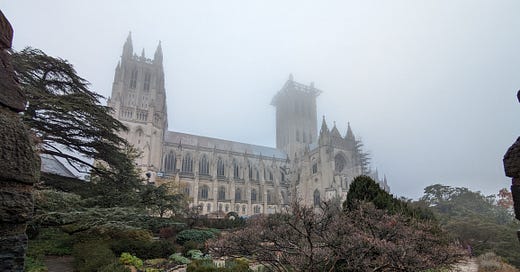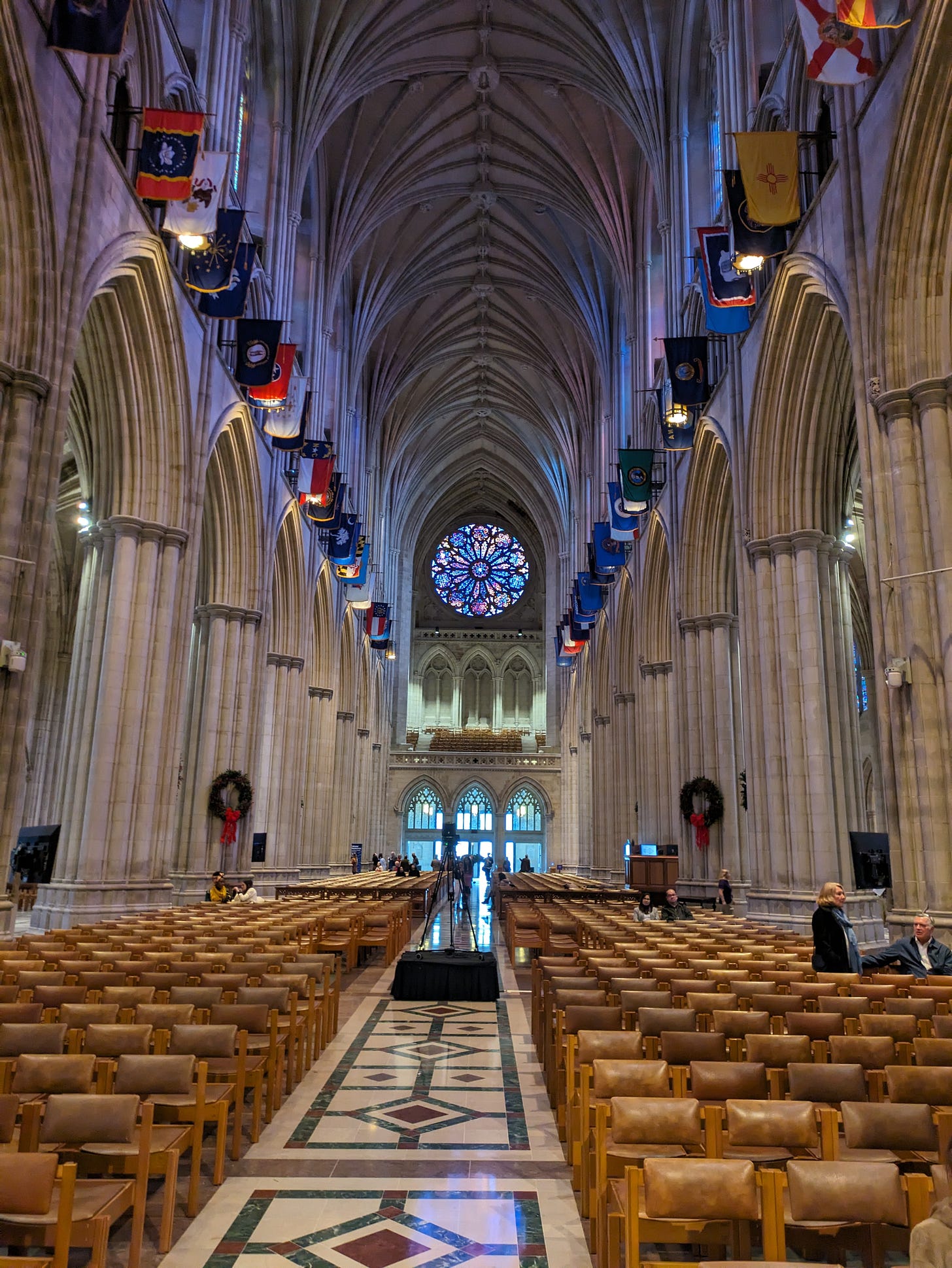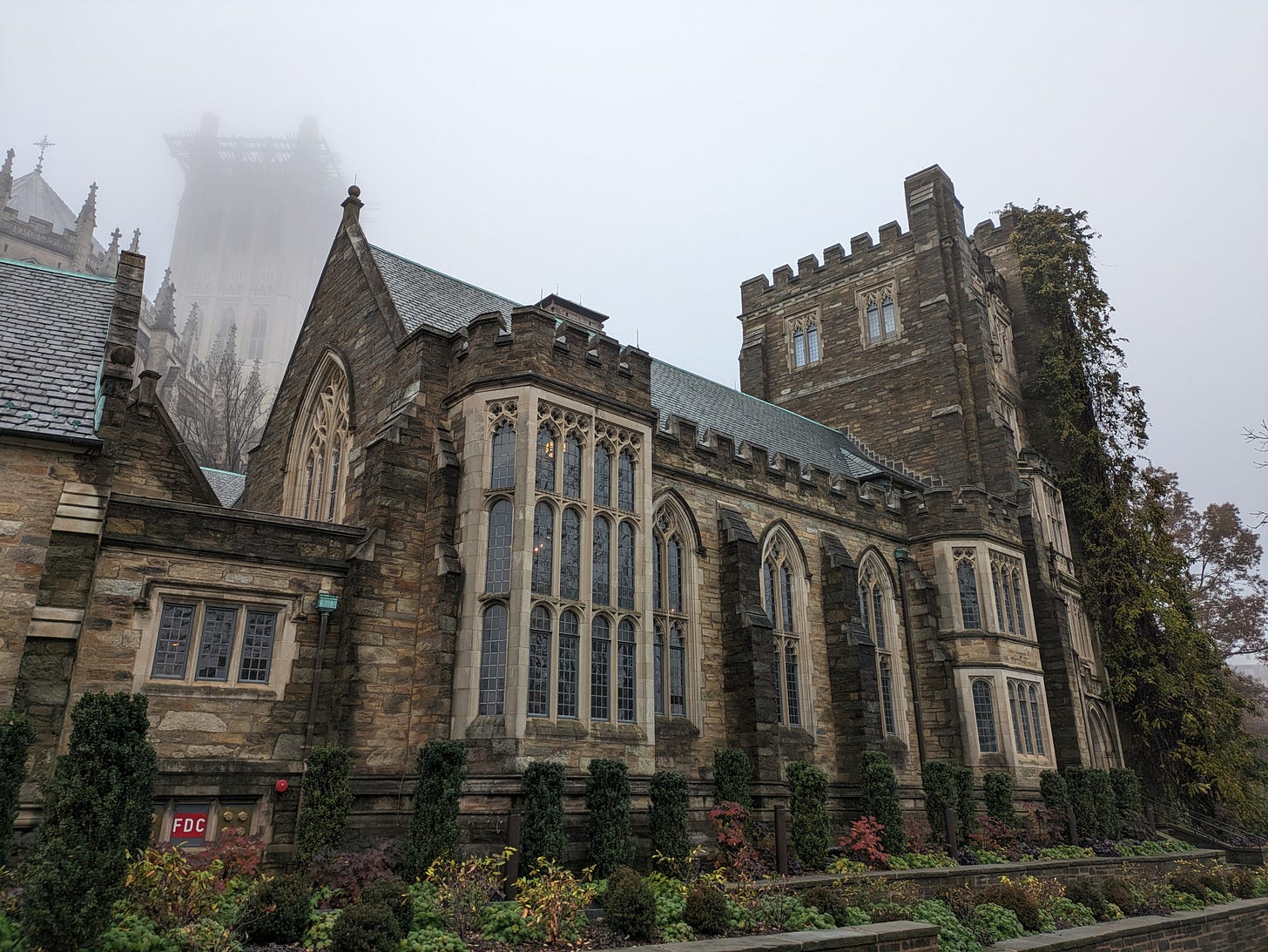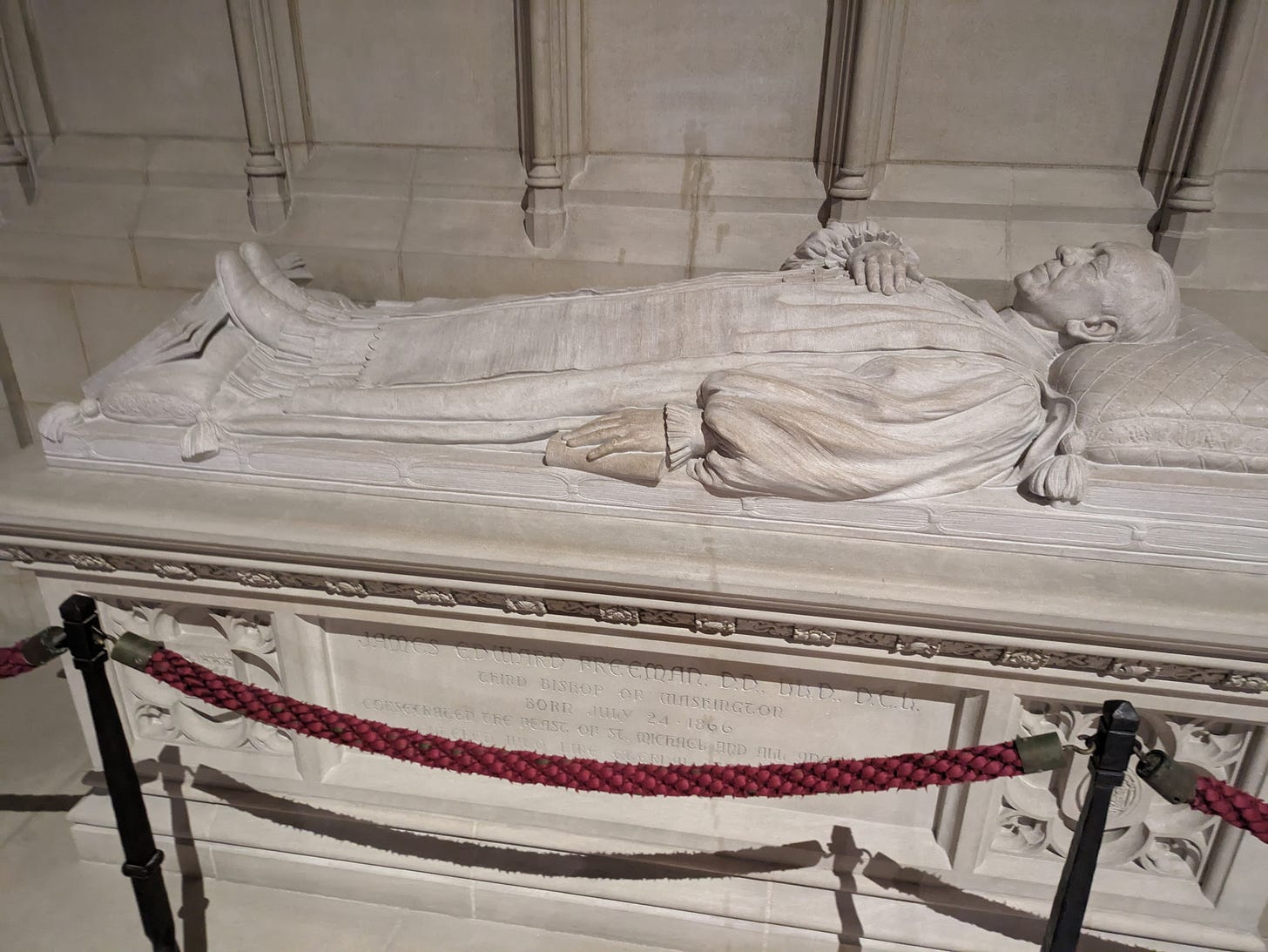[audio version of this post available here]
I’m as atheistic as I am poly, and yet I (nowadays) seek out and revel in feelings of deep spirituality. I find it hard to talk with others about spirituality, because they usually think it means belief in mystical woo stuff, and either want to engage through that (bleh) or think I’m being a magical hippie. I need to address this. What the heck is this Ineffable stuff if only the material world exists?
Spirituality is what happens when one becomes a part of something greater than oneself.
The most visceral example of this I experience regularly is The Cathedral. Last week I was at the Washington National Cathedral in DC. All one needs to do is sit in a cathedral and observe to really get a sense of what spirituality is.
These buildings are absolutely massive, and carved from stone. Not only can they not be created by one person in a lifetime, they can’t even be created by one society in a lifetime. When someone lays down the first brick of a cathedral like this, they are doing so knowing that they will never see the inside of it. They will toil at it every year, between harvests or after their day job, along with everyone else they know, and at best they’ll be able to have some make-shift services in a quarter-finished structure as old folks. This is a building that spans multiple lifetimes. When you stand inside it, you can feel the weight of your dead ancestors that gifted their labor, their life, to you, who they would never know. It brings awe.
You can’t short-cut this. An essential and unalienable key to this spirituality is the infusion of sheer time. It is the deepness of the time and the vastness of the labor itself which is the awe-inspiring part. That is what makes it a greater thing. Attempting to cut out the time is rightly viewed with disgust. It is a lie.
And it isn’t just the laying of the stones. The tile floors take many labor-years. The stained glass, the carved marble statues. The choirs singing. Every good cathedral has dead human bodies within it. Physical relics of lives that stretch across time. Columns that hold arches bridging space. And all of it has to be maintained and defended by humans that continue to put in labor and love every week.
Of course people want to be part of something this vast. The marshalling of so much human effort over so vast a time is extremely powerful. If you join the church it will use some of its power in the service of your interests.
And of course the institution will have to be restrictive. When everyone wants the power it can direct it must make sure those who would join it are aligned with its goals, lest it become corrupted and devoured. Aligning the humans to itself is crucial. When done with care, it’s one of the most profoundly glorious things an organization can do.
Humans are already partially aligned with such entities. Evolution winnowed out those who didn’t feel an emotional desire to become one with something beyond themselves. The rapture of spirituality was forced into us for no reason other than the repeated deaths of those who weren’t mentally twisted in the way that found spirituality desirable. But since we do have it, there is no reason not to take joy in it. It not only feels good, it makes us stronger (assuming we chose our organization well). And it’s a far more interesting way to live.
I want to end the post here, but I’ve been bothered by the failure of rationalism to provide us with a consistent outlet for our need for spirituality. I’ve been thinking about it a lot in the last two years, ever since my Month in Damascus.
Implications for Rationalism
We are losing people right now to religions that give people the social services of large well-run organizations and the emotional pleasure of spirituality. We should work on both of these.
We cannot take short cuts. Even if we had the people and resources to start a cathedral (we don’t) we would still not have a proper cathedral for over a century. This is exactly as it should be. A cathedral is something we will some day begin to create for our descendants or our future-selves.
In the meantime we do need something. The DC National Cathedral has a smaller church nearby which was completed much earlier and used long before the cathedral was even begun.
This is a pretty good goal, and I’ll note we already have one such structure in the Old World. Unfortunately we do not have a critical mass of enough rationalists in most places to support anything like this. And the one place that probably could pull it off (San Francisco) has the life-crushing laws of California and the soul-crushing costs of Bay Area cost-of-living to deter many people from congregating there.
We are too young to have much in the way of great elders interred within our halls. Maybe we never will, if the future arrives very quickly. But if we do last for a long time in another AI winter, I dream of the day that great cylinders full of liquid nitrogen and preserved rationalist bodies serve as our crypts and sarcophagi.
Nonetheless, while buildings are important, there are many ways to achieve oneness with something greater. The many scattered rat groups have other options. Dance Rituals, Singing Rituals, or Shamanistic Traditions, quickly come to mind. I hope to explore and write more about these in the future. We have many tools, and we’ll have to use a wide variety of them as we work to offer our people a spirituality of our own.
Though to be fully honest, I really do hope someday we’ll have a cathedral we made ourselves, so even strangers can visit, sit, listen, and feel wonder at what we are and desire to become one with it as well.








Seems like a category mistake to call this “spirituality” since spirituality usually *does* involve beliefs that are at least tacitly theistic. But then again, all the examples you’ve given--cathedrals, Shamanistic dances, etc.--are *overtly* theistic.
Seems like you want to endorse participating in theistic rituals and spaces for a feeling of “connectedness” despite being an atheist? ... and as an atheist, I’m cool with that. That feeling of awe and connectedness is great and worth seeking out ... I’m just not sure why it needs to be connected to anything tacitly or overtly theistic.
I get that feeling from climbing mountains and seeing for myself the vastness of our world. I get that feeling from thinking about the fact that the brain is made of 10 billion neurons and that 10,000 connections extend from *each* of these neurons. I get that feeling from learning about hunter-gatherers and realizing that out species has existed for *at least 300,000 years* and that we’ve only started farming (and building cathedrals, for that matter) in the last 10,000 years. Recorded history is only 3% of our entire history as a species (even less than that really), and I am here as only tiny spandrel (wink) dangling from the facade of that massive (mostly forgotten) human architecture.
Awe and connectedness are great and worth seeking out, but why do they need to be tied to things that are tacitly and overtly theistic?
I really wish I could rustle up more Rats / Rat adjacent where I live. I know it is basically incomparable, but I think there's an argument that the body of work linked to Rats: Sequences, SSC/ACX, LessWrong, HPMOR, this is doing a pale imitation of a job of a cathedral in an online space, visible, probable bricks of hard work in service of an idea.
AI Audio Conversion of this post:
https://www.patreon.com/posts/spirituality-by-94660350